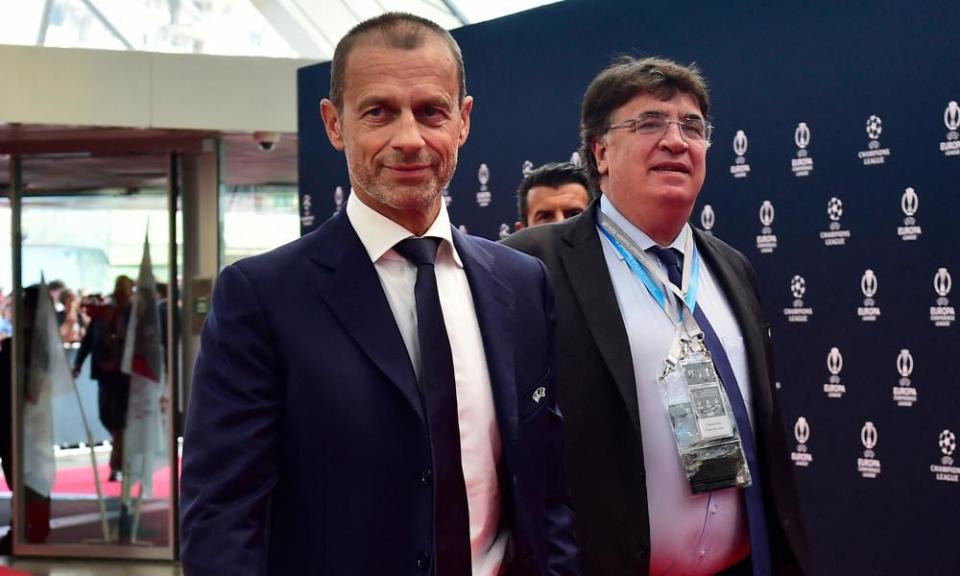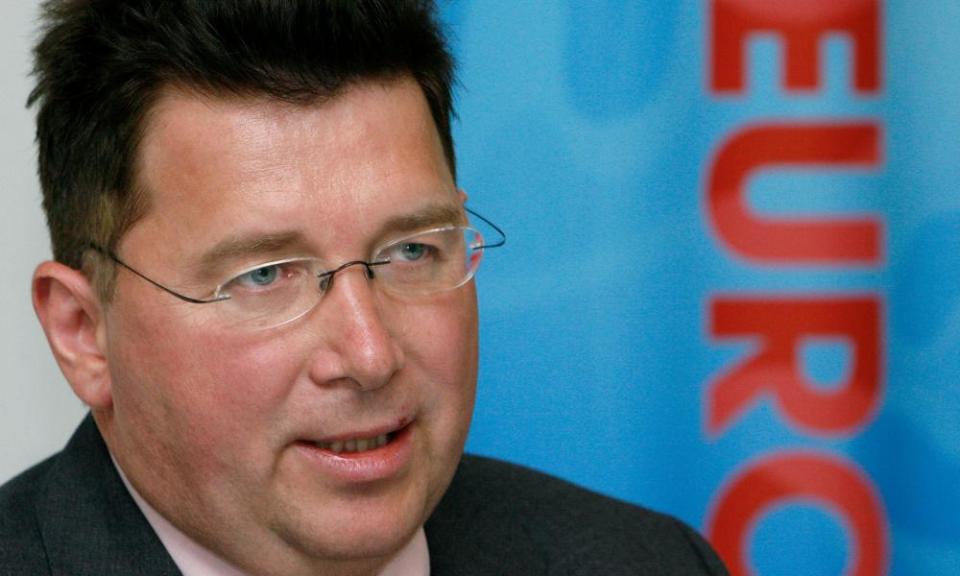Uefa accused of presenting ‘untrue’ evidence to inquiry on Champions League final chaos
Uefa has been accused of presenting “completely untrue” evidence to its own independent inquiry into the near-disaster at the 2022 Champions League final, to protect its safety and security unit – headed by the president’s best friend – from criticism.
The allegations have been made by Uefa’s then operations director, Sharon Burkhalter-Lau, an events management specialist, who was second in command in the planning of the 28 May final at the Stade de France between Liverpool and Real Madrid.
Related: How the Champions League final descended into chaos – visual investigation
The match descended into a near-fatal disaster where the safety management operation failed, and thousands of supporters suffered long static queues, crushing, dangerous policing and attacks by local thugs.
Uefa appointed a panel of experts to review the debacle, and it concluded that Uefa had “primary responsibility” because it failed to monitor and oversee the safety plans and operation in Paris. However the panel said this failure was not principally the fault of the safety and security unit whose role is to oversee safety, but of Burkhalter-Lau’s events division, because it had “marginalised” the unit.
Since 2021 the safety and security unit has been headed by Zeljko Pavlica, best friend of the Uefa president, Aleksander Ceferin, with their relationship going back decades to their lives at home in Slovenia. Pavlica’s background is in personal bodyguard security, and his level of experience and expertise to qualify him for European football’s most senior stadium safety role has been questioned by some safety professionals.
In memos sent to Uefa’s general secretary, Theodore Theodoridis, and three other senior officials, seen by the Guardian, Burkhalter-Lau rejected as “completely untrue” Uefa’s evidence that the unit had been marginalised.
Download the Guardian app from the iOS App Store on iPhone or the Google Play store on Android by searching for 'The Guardian'.
If you already have the Guardian app, make sure you’re on the most recent version.
In the Guardian app, tap the Menu button at the bottom right, then go to Settings (the gear icon), then Notifications.
Turn on sport notifications.
Saying that she could not accept the conclusion that Uefa and its events division bore primary responsibility for the chaos, as the panel concluded, Burkhalter-Lau emphasised her view that the problems had principally been caused by the Paris police, over whom Uefa had no authority, and she rejected the accusations against her team: “The claim that Uefa Events … senior management marginalised the Uefa security unit is based on statements provided by Uefa that were untrue and concerted,” she wrote.
Burkhalter-Lau alleged that Pavlica and his team did not turn up for vital meetings about safety including in the run-up to the final, and failed to provide crucial information for the planning process.
In his evidence to the panel, which was not included in the panel report, Pavlica said that on the evening of the final, he was in the VIP area for almost the entire time. He told the panel that he had been unaware of the crisis until he was called to a meeting at 8.45pm, where Ceferin took the decision to delay the kick-off.
That was despite the scenes that had been developing outside for hours, Pavlica’s own staff being in the stadium’s control centre, and some of them raising alarms from as early as 5.19pm in the unit’s WhatsApp group.
Burkhalter-Lau’s allegations raise further questions about Uefa’s culture under Ceferin. After the final, the Guardian reported on serious concerns about alleged cronyism in Uefa appointments, with Pavlica and four more of Ceferin’s associates from Slovenia appointed to key positions. Uefa denied the accusation of cronyism, saying they were all “proven professionals”.
Ceferin subsequently confirmed he had been instrumental in these appointments and suggested he should be applauded for it, saying in an interview: “If I brought competent people that I trust to Uefa, that are hard-working people there … I think I am quite good in this world of football.”
‘There has been an agreed strategy to protect the security unit’
Having begun working in events management in the 1990s, Burkhalter-Lau joined Uefa in 2002 as head of operations for the European Championship held two years later in Portugal. She headed operations for Uefa’s major matches and tournaments for two decades after that, and was promoted to operations director in 2016. In 2021 Uefa highlighted her, in a feature celebrating women working in football, as one of the stars of the European Championship, heading a team of 650 people responsible for staging club finals and European Championship tournaments.
In Burkhalter-Lau’s first memo, sent to Theodoridis in January, she wrote: “Following the Paris final, we discussed that we must protect the security unit from the fallout.” But Uefa’s evidence that Pavlica’s unit had been sidelined was “untrue”, Burkhalter-Lau said.
“I understand now that there has been an agreed strategy to protect the security unit by stating that all safety and security matters would be communicated via project management, which places the blame for any perceived errors or omissions on Tiziano’s team,” she wrote in her memo, with reference to Tiziano Gaier, a Uefa official in Burkhalter-Lau’s division responsible for the final operations. “Needless to say, it is completely untrue …”
She accused Theodoridis and the head of Uefa events, Martin Kallen, of signing off on Uefa’s official evidence to the panel that included a statement that was “completely untrue”. It stated that “all aspects of [safety and security unit] matters regarding the final” would be communicated to the French Football Federation (FFF), which was responsible for running the matchday operation, through Burkhalter-Lau’s events project management division.

Burkhalter-Lau alleged that this statement was “untrue”, and that the safety and security unit was in direct contact with the FFF, often without adequately involving the broader Uefa planning operation.
She said that the unit also customarily made its own direct contact with police forces, and she had been “greatly surprised” to see a complaint that they had been unable to communicate with the Paris police before the final.
The evidence “not only protects the security unit but effectively places the blame on Tiziano’s team”, Burkhalter-Lau wrote. She accused Uefa’s director of national associations, Zoran Lakovic, of presenting the same false claim in evidence he gave to the panel in person.
Burkhalter-Lau stressed that the safety and security unit was fully incorporated, with all other relevant Uefa units, in a comprehensive, detailed event planning system, with regular meetings, a weekly meeting for heads of units, working visits to the Stade de France, and constant communication.
Pavlica received full information for all the meetings, and any issues, including safety and security, were to be reported and escalated through this system, and necessary action taken, she said.
However she alleged that Pavlica was deficient: “He has been invited to all operations group meetings in the days leading up to the club finals … however, he hasn’t always attended. In several instances, Tiziano has had to insist with Zeljko that the security unit is represented in these meetings.”
She also alleged that other members of Pavlica’s team failed to attend crucial meetings, and operated independently of the match planning process, including by not providing crucial feedback from observing the French cup final at the same stadium three weeks before 28 May.
“When the security project leaders for [the Europa League final] and [Champions League final] had not foreseen to attend the finalist meetings, I was made aware by Tiziano and I escalated it to Zoran as we considered their presence to be essential.”
‘There were different views internally on the events and actions of that night’
Ceferin, a lawyer in Slovenia, and Pavlica, former head of personal security for the country’s former president Janez Drnovsek, have been friends for decades, and Ceferin was best man at Pavlica’s 2018 wedding. Shortly after Ceferin became president of Slovenia’s football association in 2011, Pavlica was given his first job in football, working for the association as a safety and security officer.
Pavlica began doing some part-time work for Uefa, as many national safety officers do, in 2014. After Ceferin won the election to become Uefa president in September 2016, Pavlica was promoted to a permanent role at Uefa, as a security adviser.
In 2021 Uefa’s previous head of safety and security, Kenny Scott, a widely respected former Strathclyde police match commander and safety officer at Rangers, retired. Pavlica was appointed to replace him, following no formal recruitment process. Uefa said he was the “natural successor”.
Among football safety professionals, concerns have been raised about Pavlica’s qualifications for the immense complexities of overseeing safety at Europe’s biggest football matches. Some sources believe that he maintains a bias towards personal security, and accompanies Ceferin to matches rather than taking responsibility for the overall safety at a stadium. Uefa has rejected that concern.
But Burkhalter-Lau’s January memo appeared to support it, saying: “I personally urged Zeljko not to turn up at the [Stade de France] with the president on match day but to be present not later than 16:00 [4pm].” The safety and security unit’s WhatsApp group messages, published by the panel with names redacted, show that some of Pavlica’s staff arrived for duty at 10am.
In his evidence to the panel, Pavlica appeared to confirm the perception that he saw his role as personal protection of senior figures, making it clear that he stayed in the stadium’s VIP area throughout the hours when the chaos was developing outside. They had “many, many, very, very important guests” there, he said, including “top Uefa management, [and the] president,” and that was also a “security question”.

After the panel reported in February, delivering its central conclusion that Uefa’s events division had marginalised the safety and security unit, Burkhalter-Lau wrote again to Theodoridis and three other senior Uefa officials. It was, she said, “extremely distressful” to see her department blamed for so serious and life-threatening a series of failures based on such evidence.
In May this year, shortly before the Champions League final in Istanbul, Burkhalter-Lau informed Uefa staff by email that she, one of the few women working in a senior position, was leaving the organisation.
Related: Report highlights ‘multiple failures’ in handling of Champions League final
Uefa responded to questions from the Guardian about Burkhalter-Lau’s allegations, Pavlica’s performance and qualifications for his role, and the concerns about cronyism, saying its response was also on behalf of Ceferin, Theodoridis, Pavlica, Kallen and Lakovic, whom the Guardian contacted individually. Uefa said it established an “internal working group” after the near-disaster at the final and the setting up of the review.
“The group, and Uefa more broadly, had numerous discussions about the events in Paris, some of which reflected the different views internally on the events and actions of that night,” Uefa said.
“Some of those differences were also reflected in the evidence given by various Uefa directors to the panel, evidence that was given in good faith and to the best of the individuals’ knowledge and recollection.”
Uefa added that its internal working group had implemented an action plan following the panel’s recommendations for improvement, which it said had been well-received by supporter groups.
Pavlica is said to be shortly moving from his position to a different role within Uefa; the organisation declined to confirm that.
The Guardian contacted Burkhalter-Lau to discuss the final and her criticisms of Uefa’s evidence; she declined to comment. In May this year Ceferin was elected unopposed, “by acclamation”, as Uefa president for another four years.

 Yahoo Sport
Yahoo Sport 






































